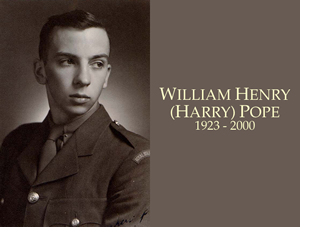
Just after dawn on May 19th 1944 on the Italian front, a 21 year old Canadian lieutenant discovered that a quick foray in the early morning darkness had landed him and several of his comrades in the midst of the Hitler Line, surrounded by enemy bunkers. For several hours the Canadian soldiers were pinned to the ground, as bullets whistled over their heads. After a mortar landed nearby and severely wounded two of them, the lieutenant crawled back to his company and asked for a stretcher and some bearers. This request being granted, he and the stretcher-bearers put aside their weapons and donned Red Cross armbands, then advanced on the open battlefield, only to be taken prisoner by the enemy. Once the German captain appeared on the scene, Lieutenant Pope strenuously objected to this turn of events: "I come from a military family and cannot accept the dishonour of being made a prisoner," he informed the surprised captain. "So long as I have reason to believe we will all be repatriated, I will not try to escape; but as soon as I come to realize that we won't be, then it will be my duty to escape."
Harry Pope was true to his word. Eleven days later, he jumped off a transport truck on its way to a POW camp, and for the next two months fought behind enemy lines, alongside Italian partisans and British parachutists, before rejoining his own Canadian regiment. For those who knew him after he'd ended his career as a professional soldier, and joined Ryerson's Department of Economics, these early exploits came as no surprise. Harry had an easily identifiable military demeanour and aristocratic bearing. His mother was a countess from a Belgian family that traced its lineage back to Napoleon's general Jean-Baptiste Dumonceau. Harry's father, a lieutenant general in the Canadian army, was the son of Sir Joseph Pope - one-time private secretary to J.A. Macdonald and a lifelong public servant who was credited with setting up the Department of External Affairs and choosing Canada's heraldic motto "a mari usque ad mare" (from sea to sea). Harry's great-grandfather was William Henry Pope (after whom he was named), one of the Fathers of Confederation.
Harry's affinity with the military led him to enter the class of 40 at Royal Military College. After graduating, he joined the Voltigeurs of Quebec and then the Royal 22e - a French Canadian regiment. (He was very proud of the French branches in his family tree - not only on his mother's side, but his father's as well. Harry's paternal grandmother was a Taschereau descended from some of the very first Quebec settlers.) Besides his record in World War II (twice mentioned in despatches), Harry was awarded the Military Cross during the Korean War and promoted to major. In peacetime, he pursued university studies part-time and held a series of staff and regimental posts until the late 1950s, when he took strong exception to NATO's defensive strategy of limited nuclear war - a prospect he viewed as nothing short of suicidal. In 1959, he publicized his opposition to NATO policy in an article he wrote for the Canadian Army Journal, and, a few months later, he submitted his resignation from the military.
Harry was a supporter of the socialist CCF - a marked departure from his family's political past. After his exit from the army, he took on political work. For several years he was employed as an assistant to the federal leaders of the CCF and the NDP, Hazen Argue and Tommy Douglas, and for a shorter time was president of the fledgling Social Democratic Party (CCF) in Quebec. Later, while a graduate student, first at the University of Ottawa and then the University of Toronto, he ran several times as an NDP candidate.
In 1967, after a summer as a research assistant for the federal task force inquiring into foreign ownership of the Canadian economy, he began his teaching career at Ryerson. For the next two decades, he taught courses in Canadian economic problems, economic development, and economic principles, while publishing widely. His first book, The Elephant and the Mouse (McClelland & Stewart, 1971), received extensive popular attention, with its call for a concerted public effort to regain control of the Canadian economy. Later books and articles continued this theme, as well as elucidating Harry's own identifiable perspective on economic policy, which combined a post-Keynesian theoretical stance with a focus on monetary and balance-of-payments issues. Harry strongly believed that full employment was possible without inflation, and his solution entailed radical monetary reform combined with wage and price controls. Though these views had led him early on to the CCF and the NDP, later he lost faith in the conventional parliamentary parties. He focused instead on the Committee on Monetary and Economic Reform (COMER), of which he was a founding member, and, during the early 1990s, was a candidate and shadow finance committee chairman in the short-lived National Party.
To Ryerson students, he was better known as a dedicated teacher and co-author of five successive editions of McConnell and Pope's Economics (also a co-author of a French language version) - a first-year text used at universities and colleges across the country. After his retirement in 1987, his writing career continued, his last textbook, All You Must Know About Economics, appearing in 1996. In the past few years, he wrote his war memoirs, which are due to be published this spring. Just 10 days before he died of cancer-related complications, on December 23 of last year, the first half of this manuscript arrived from his editor, and, with his characteristic zeal and powers of concentration, Harry worked through the pages. He leaves behind his wife Sheila, as well as their 21 year old son Richard, currently studying International Relations and Semiotics at the University of Toronto.
Ryerson is establishing an award in honour of this remarkable Canadian.